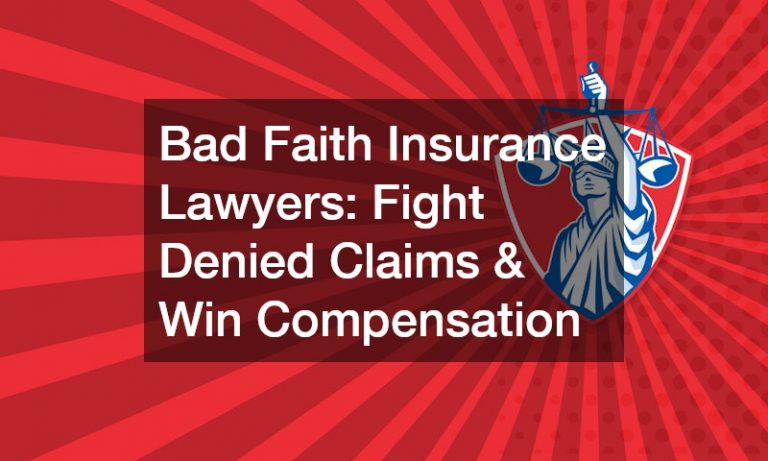
Insurance is meant to be a safety net that offers peace of mind, assurance of coverage, and financial protection against unforeseen events. However, there are instances when insurance companies do not act in good faith and deny valid claims unjustly. In such situations, bad faith insurance lawyers become invaluable allies for policyholders seeking justice and compensation. These attorneys specialize in navigating the legal and contractual landscape between insurers and the insured, ensuring that insurance companies honor their contractual obligations.
Whether it’s a life insurance claim, health insurance dispute, or property damage coverage, understanding how to engage with these legal professionals can be crucial in recovering owed funds.
Understanding Bad Faith Insurance
Bad faith insurance occurs when an insurer fails to treat its policyholders fairly, denying claims without valid reasoning or delaying resolutions unreasonably. This practice is not only unethical but also illegal in many jurisdictions, leading to legal recourse for affected policyholders. Bad faith can manifest in various forms, such as refusing payment without investigation, misrepresenting coverage details, or conducting inadequate claims processing protocols. By understanding these tactics, policyholders are better equipped to identify when they are being wrongfully denied. Seeking the assistance of bad faith insurance lawyers helps consolidate a case against the insurer, facilitating the pursuit of rightful compensation.
The role of bad faith insurance lawyers is to analyze the insurance policy’s terms and the claim’s specifics, discerning discrepancies between the insurer’s actions and its legal obligations. They possess a keen understanding of both insurance law and the legal system, enabling them to mount a formidable challenge in court if necessary. Furthermore, they are adept at collecting and presenting evidence that substantiates the claimant’s position, showcasing how the insurer’s actions or inactions constitute bad faith. Their expertise extends to advising clients on the feasibility of a lawsuit or settlement, often preceding negotiation discussions with the insurer.
In many regions, bad faith insurance practices have prompted legislative efforts aimed at protecting consumers. Through the diligent work of advocacy groups and legal professionals, new laws have been enacted to deter insurers from engaging in unfair practices. An example includes penalties imposed for violations or mandates requiring expedited processing of claims. Bad faith insurance lawyers are at the forefront of utilizing these regulations to their clients’ advantage, strategically leveraging the law to extract favorable outcomes.
The Process of Filing an Insurance Claim
Filing an insurance claim is a structured process that typically begins with notifying the insurance company of an incident or loss. It is crucial for policyholders to promptly report the situation, following the specific reporting protocols outlined in their insurance policy. Comprehensive documentation, such as photographs, receipts, and reports, becomes pivotal in substantiating the claim. Despite an often lengthy verification process, insurance companies are expected to operate honorably, upholding the terms of the contract.
Policyholders must be diligent in keeping meticulous records of all communications with an insurer, noting the date and nature of each interaction. When an issue of bad faith arises, this documentation becomes valuable evidence in refuting the insurer’s stance. Additionally, policyholders should familiarize themselves with their policy’s fine print to preempt misunderstandings regarding coverage limits or exclusions. By understanding the clauses and conditions, they can better manage expectations and develop a more robust foundation for their claim. This proactive approach is encouraged by bad faith insurance lawyers, who often supplement their clients’ efforts with legal expertise to pursue a just outcome.
Insurance companies typically assign adjusters to investigate claims, gathering information that influences the reimbursement decision-making process. A discrepancy between the policyholder’s claim and the adjuster’s findings can lead to a denial or reduced offer, resulting in frustration and financial strain. When confronted with such a scenario, consulting a bad faith insurance lawyer is advisable to ensure fair treatment.
Factors to Consider When Hiring a Bad Faith Insurance Lawyer
Choosing the right bad faith insurance lawyer involves considering experience, expertise, and a proven track record in successfully handling similar cases. Potential clients should research the lawyer’s credentials, looking for specialists who have demonstrated success in insurance litigation. In addition to qualifications, a lawyer’s reputation in the legal community and their standing with past clients offer insights into their efficacy and strategy. Client testimonials and peer reviews can attest to the lawyer’s proficiency, indicating whether their approach aligns with the client’s objectives and expectations. A meticulous selection process ensures policyholders have the best representation possible to challenge insurers.
The financial arrangement is another critical factor, as clients must assess whether they prefer contingency fees, hourly rates, or flat fees. Bad faith insurance lawyers often operate on a contingency basis, meaning they earn a percentage of the compensation only if the case is won. This setup minimizes financial risk for clients, aligning the lawyer’s success with their own settlement or award. Discussing fee structures upfront and understanding all potential costs associated with the litigation process can prevent misunderstandings down the line.




